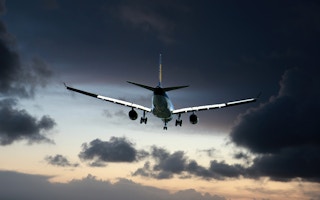Despite what aviation giants may say, green air travel is still decades away. Instead of backing the sector’s return to its climate-disrupting ways, governments should initiate its transformation and reskill workers to cushion the social impacts of the changes ahead, states a new report.
Reducing passenger flights is critical to averting catastrophic heating. As Covid-19 keeps the industry grounded, nations should ask themselves how they can foster alternatives to flying and harmful tourism, and how to do so fairly.
Policies can be effective in halting airport expansions, restricting lobbying, and putting caps on flight numbers. But for the transition to be just, responsible stimulus spending is key, argues the paper, by the Public and Commercial Services Union (PCS), a United Kingdom-based trade union, and Stay Grounded, a Vienna-based network that advocates for a cut in air travel.
Rather than bailing out airlines, airports and plane builders, governments’ recovery packages should provide social protection for those exiting the industry, fund retraining programmes, and create employment in climate-safe sectors.
Using taxpayers’ money to return aviation to its previous business model and growth path would mean setting the industry up for a larger crash when it becomes obvious that flying is no longer justifiable as the climate continues to break down, reads the report, titled A rapid and just transition of aviation: Shifting towards climate-just mobility.
It shows that as of August last year, governments from 57 countries had committed €137 billion (US$166 billion) in taxpayer-funded financial aid to airlines. Notwithstanding global calls for a green recovery, this money was granted without effective social and environmental strings attached.
“Public money must save people, not planes”, said Magdalena Heuwieser, a campaigner at Stay Grounded. “If we try to go back to the old high-speed fossil-fuelled transport system, it will crash very soon. Let’s be realistic: aviation will change, and it will do so either by design or by disaster. So, let’s choose design.”
A wider transformation
The prolonged downturn in air travel due to coronavirus lockdowns has disrupted aviation worldwide, with air traffic dropping well below 10 per cent for several months last year. The industry expects to be operating at a lower capacity for the next three to five years.
It isn’t just pilots, aircraft manufacturers and flight attendants who’ve lost their jobs. With international tourist arrivals down 70 per cent last year, communities dependent on tourism for their livelihoods have been dealt a devastating blow.
A report by a Geneva-based coalition of aviation industry organisations released last September, estimated the collapse in international travel could wipe out 46 million jobs globally.
But the sector’s vast environmental footprint calls for aviation to accommodate the need for both job security and a decline in flying. And that means changes in the industry must be part of an overall societal transformation involving new modes of living, working, producing, and consuming, states the new report.
The need to safeguard the future of workers and communities currently dependent on the sector should not be an argument for delaying climate action, but for managing the transition effectively, fairly, and democratically, it argues.
In 2018, airlines were responsible for 2.4 per cent of global carbon dioxide emissions, with commercial flights rising about 70 per cent faster than predicted.
At present, there are no feasible solutions for sustainable air traffic available. Electrification will not be a plausible option for decades to come. Aircraft manufacturers have improved efficiency over the years, but allegedly green aviation fuels, such as biofuels or synthetic fuels, are not expected to be available in the quantities needed anytime soon.
The industry is also exploring carbon capture and storage solutions to suck the carbon emitted back out of the atmosphere, but critics say the technology will not be ready in time to prevent dangerous global warming.
What should governments do?
A combination of policy tools is needed to ensure aviation operates within the confines of the planet’s and countries’ emissions budgets, says the report.
No longer greenlighting new airstrips would be a start, but governments will need to play a more active role in the sector’s degrowth. Measures that policymakers can take include a ban on aviation-related advertising, a removal of subsidies, and an introduction of heavier fuel taxes.
Flights should be prioritised for those who need them, and those who fly frequently should be charged more. Companies should also heed lessons learned during pandemic lockdowns and permanently replace business travel with online conferences.
Countries must build the infrastructure required to foster affordable, climate-friendly modes of travel, such as trains, coaches, and battery-powered ferries. Local and regional tourism will need to replace long-haul flights.
But for a just transition, governments will also have to find solutions for millions of stranded aviation workers, as well as others employed in tourism and related sectors. And that means channeling stimulus spending where it’s really needed.
It’s not that there aren’t enough opportunities emerging: Climate-safe modes of transport are set grow, as are renewables. A recent report by the International Renewable Energy Agency (IRENA) shows that clean energy accounted for an estimated 11.5 million jobs worldwide in 2019, up from 11 million the previous year. Meanwhile, old, fossil fuel-based infrastructure must be taken down and recycled.
Governments, however, will have to support workers to take advantage of such opportunities. Providing subsidies for new businesses, for instance, can create employment, while education programmes can enable people to switch to other industries.
Time is of the essence, states the paper. The longer the shift from fossil fuel-powered industries takes, the more unjust and difficult it will eventually be.

















